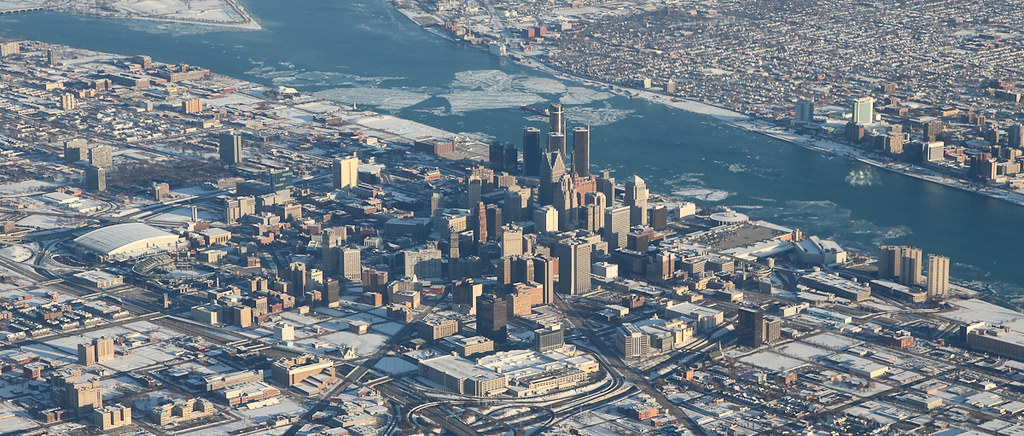
Calling their communities sacrifice zones for being home to hazardous waste storage sites, residents in a Detroit neighborhood are taking a stand.
Last week, residents with support from the Great Lakes Environmental Law Center filed a formal complaint with Michigan’s Department of Environment, Great Lakes, and Energy over the agency’s January decision to allow a storage site to increase capacity by nine fold.
The license alteration granted by EGLE allows the plant operator, U.S. Ecology, to expand storage capacity from 76,000 tons to 677,000 tons.
The facility “provides safe and compliant waste treatment for industrial customers in the Michigan area,” according to spokesperson David Crumrine, who said the site has been in place for 40 years and was acquired by U.S. Ecology in 2012.
The permit, along with regulatory oversight and other safeguards, ensure that waste at the site “will be managed responsibly” in order to protect human health and the environment and the neighboring community, Crumrine said.
Crumrine said the physical footprint of the plant will not increase.
In approving the expansion, EGLE said the facility satisfies all operating standards under existing rules and “does not, at this time, present a hazard to human health or the environment.”
Discrimination complaint
The complaint filed with EGLE is a discrimination complaint rooted in the Civil Rights Act of 1964 and is meant to ensure compliance with federal civil rights law, according to the GLELC press release.
A secondary purpose is to “aid EGLE in achieving its mission of environmental justice for all Michiganders,” according to the release.
The U.S. Ecology site is located in Detroit, north of downtown, and 80 percent of the population within a 3-mile radius are minorities, according to the complaint.
The regulations cited in the complaint “prohibit EGLE’s decision from having a discriminatory effect based on race, color or national origin,” GLELC executive director Nick Leonard told Great Lakes Now.
Specifically, the complaint asks EGLE to revise “the state hazardous waste management plan to stop the disproportionate siting of commercial hazardous waste facilities in communities of color.”
If successful, the complaint would prohibit issuance of new licenses until revisions to the plan are complete.
Regulatory agency
“As a regulatory agency, we are required to follow the laws governing hazardous waste storage,” spokesperson Jill Greenberg said in response to a Great Lakes Now inquiry to explain the basis for the decision.
Greenberg did not address the civil rights specifics in the complaint.
Greenberg said EGLE is cognizant of environmental justice issues and its work has been enhanced by the creation of an environmental justice public advocate and an increased focus on public participation and meaningful engagement.
“The public advocate office was created to address the integration of environmental justice and incorporate the lens of equity into how we work in state government,” said Regina Strong, who holds the public advocate position.
But Strong cautioned that change “is not as simple as a flip of the switch.” She said it’s a “nuanced journey” to incorporate environmental justice values throughout the agency.
Strong said her office would prefer to work with communities to prevent the need of filing a formal complaint.
“However, we take this complaint seriously and are working through our process to address the concerns,” Strong said.

Michelle Martinez, Michigan Environmental Justice
Coalition coordinator (Photo courtesy of MEJC)
EGLE held two public comment sessions prior to approving the expansion, according to a fact sheet available on the EGLE website. The sheet said modifications to the permit based on public comments included changes in traffic flow and a limit on the volume of traffic. Environmental justice concerns were not mentioned.
Community activist Michelle Martinez, who lives 6 miles from the U.S. Ecology site, said she understands that the Whitmer administration “has taken progressive steps on environmental justice.”
Martinez is the statewide coordinator for the Michigan Environmental Justice Coalition.
But she says the administration has “fallen short on material outcomes.”

Nick Leonard, executive director of the Great Lakes Environmental Law Center (Photo courtesy of GLELC)
“It’s still measuring success by citing processes and procedures instead of outcomes. Appointing an advisory council is not a measurable action relative to exposure,” Martinez said.
“Michigan needs to be a leader on getting hazardous material storage sites out of neighborhoods that are overwhelmingly people of color,” Martinez said.
GLELC’s Leonard echoed Martinez’s comments, saying “the national spotlight on social and environmental justice places an emphasis on actions.”
EGLE has 14 days from the date of filing to review the complaint and determine if an investigation is warranted. If an investigation proceeds a response is required within 180 days.
Read more environmental justice and advocacy stories on Great Lakes Now:
Great Lakes Moment: A tribute to Guy O. Williams, environmental justice champion
Court: Flint class-action can proceed over lead in water
Priority Shift: Chicago mayor sets environmental sights on neglected communities
Environmental Justice During COVID-19: Communities bear extra burden
Across America, Five Communities in Search of Environmental Justice
Featured image: Downtown Detroit (Photo by Tim Wang, CC BY-SA 2.0 via Flickr)




